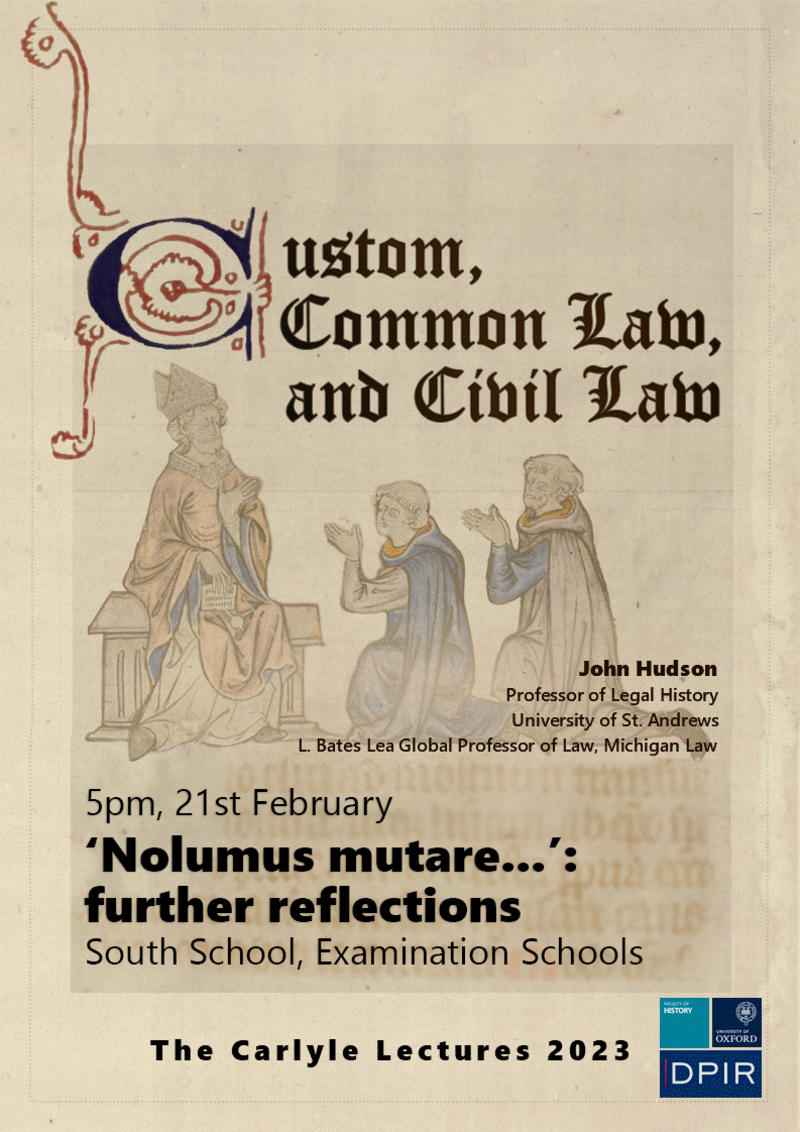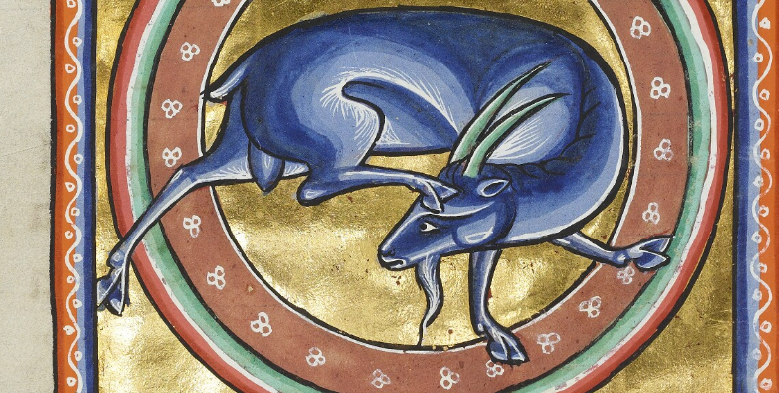Teaching term may be starting to wrap up, but things are still extremely busy here at OMS. There are so many exciting events and upcoming free-to-attend online conferences for us to enjoy that it’s hard to remember that we are entering the final fortnight of term! That said, I am sure I am not alone in feeling quite tired at this point in the term. For those of you feeling likewise, here is some wisdom from Alcuin:
Saepe […] bos lassus fortius figit ungulam
[The tired ox always puts his hoof down more strongly, Ep. 85]
In other words, though we might be tired this week, we might still do our best work! Here is the week’s roundup of events – there’s lots to take strength from:
ANNOUNCEMENTS:
- Medieval Vestments Conference at St John’s College (March 9-10). Taking inspiration from the college’s unique gallery of stunning medieval vestments, this conference will feature two day’s worth of speakers and presenters. These presentations will be enriched by displays from both the college and Bodleian Library archives as well as a dynamic exhibition of works created during the conference workshops. Please register for the segments that you are interested in and able to attend here on eventbrite.
- The After Constantine Journal, Medievalists.net, and the Orthodox Academy of Crete invite you to attend the conference Easter in Late Antiquity and the Middle Ages, which will take place on Zoom and YouTube on April 1st, 2023. This conference will examine how Easter was celebrated and viewed from Late Antiquity throughout the medieval period. Every year this would be a high point of the Christian life, and late antique and medieval people were keenly interested in many aspects of this event. For full details, please see here.
- There will be a half-day colloquium on the quattrocento scholar, Sicco Polenton, and his magnum opus – the first extended history of Latin literature to have been written in modernity – at Faculty of Classics in Oxford on Friday, 14 April 2023. It will begin at 13:45. Attendance is free, but please register attendance by writing to Tristan Franklinos.
EVENTS THIS WEEK:
Monday 27th February:
- The Byzantine Graduate Seminar will not take place today. The seminar resumes next week!
- The Medieval Latin Manuscript Reading Group led by Matthew Holford and Andrew Dunning is meeting as usual via Teams from 1-2pm. We will continue with natural history from a medieval encyclopaedia. Sign up for the mailing list to receive updates and the Teams invite, or contact matthew.holford@bodleian.ox.ac.uk or andrew.dunning@bodleian.ox.ac.uk for more information.
- The Queer and Trans Medievalisms Reading and Research Group meets at 3pm at Univ College, 12 Merton St Room 2. This week’s speaker is Kat Smith on ‘The female pursuit of knowledge through the Virgin Mary’s breasts in 15th century Castile’. All extremely welcome! To join the mailing list and get texts in advance, or if you have any questions, email rowan.wilson@univ.ox.ac.uk.
- The Seminar in Manuscript Studies and Palaeography will take place at 2.15-3.45pm, in the Weston Library, Horton Room. This week’s speaker will be Laura Light (Les Enluminures), “Latin Bibles in England c. 1200-c. 1230“. For further information contact matthew.holford@bodleian.ox.ac.uk or andrew.dunning@bodleian.ox.ac.uk.
- A special lecture on Islamic Law in Norman Sicily, by Professor Jeremy Johns, will take place at 5pm in the L. W. Auditorium, Wolfson College.
- The Medieval History Seminar takes place at 5pm in the Wharton Room, All Souls College. This week’s speaker will be Liesbeth van Houts (Cambridge), ‘Towards a new biography of Empress Matilda: what can be known about the women of her acquaintance?.‘ (You may also attend remotely, Teams link here: or log in to Teams with your .ox.ac.uk account and join the group “Medieval History Research Seminar”, team code rmppucs. If you have any difficulties please email: medhistsem@history.ox.ac.uk).
- The Lincoln Leads seminar takes place at 5.30–7pm at Oakeshott Room, Lincoln College. This week’s panel is ‘Failure and First Drafts’. Book a free place here: https://www.eventbrite.co.uk/cc/lincoln-leads-2023-1539199
Tuesday 28th February:
- The Europe in the Later Middle Ages Seminar will take place at 2–3.30pm in the New Seminar Room, St John’s College. Tea and coffee available from 1.45pm. This week’s speaker will be Peter Crooks, Trinity College Dublin, ‘Chimera of Conquest: Colonial Warfare in Late Medieval Ireland‘.
- The Codicology and the material book seminar takes place at 2-3.30pm in the Weston Library, Lecture Theatre. This week’s speaker will be Teresa Webber, on Medieval Libraries.
- Dr Nelson Goering will be talking about Old High German and Old Saxon metre from 2:15 to 3:45 on the ground floor of the Linguistics Faculty on Walton Street as part of the Comparative Linguistics Seminar.
- The Medieval French Research Seminar takes place at 5pm at the Maison française d’Oxford (www.mfo.ac.uk). Drinks at 5pm, presentations begin at 5.15pm. This week’s speaker will be Dominique Lagorgette (Université Savoie Mont Blanc), ‘“Par sainct Copin, je suis tanné”. Jurons et blasphèmes dans quelques textes des en moyen français : représentations de l’oralité et transgression’. For more information, to be added to the seminar maillist, or for the Teams link to join a seminar remotely, contact helen.swift@st-hildas.ox.ac.uk.
- Medieval Church and Culture meets on Tuesday at Harris Manchester, 5pm (tea and biscuits) for a 5.15pm paper. The speaker will be Elena Lichmanova (Merton), on Humour in the Margins: the interpretative problem.
- The first of this year’s E. A. Lowe Lectures in Palaeography takes place at 5pm in the MBI Al Jaber Auditorium, Corpus Christi College. This year’s lectures are given by Prof. Niels Gaul, A G Leventis Professor of Byzantine Studies and Director of the Centre for Late Antique, Islamic and Byzantine Studies at the University of Edinburgh. Today’s lecture will be on the subject of “Codex”, and explores the phenomenon of Byzantine literati curating their own writings in codex format and possible ancient and patristic models; with glances at similar practices in other medieval manuscript cultures. All welcome.
Wednesday 1st March:
- No Medieval German Seminar this week – watch out for some special events in week 8 with guest Dr Aletta Leipold from the Althochdeutsches Wörterbuch (Leipzig)!
- The Medieval Italian Seminar has been changed to Friday: please see full details there.
- The Medieval Latin Document Reading Group meets on Teams at 4-5pm. We are currently focusing on medieval documents from New College’s archive as part of the cataloguing work being carried out there, so there will be a variety of hands, dates and types. A document is sent out in advance but homework is not expected. Contact Michael Stansfield (michael.stansfield@new.ox.ac.uk) for further details and the Teams link.
- The Late Antique and Byzantine Seminar takes place at 5pm at the Ioannou Centre for Classical and Byzantine Studies, 66 St Giles. This week’s speaker will be Nikos Zagklas (Univ. of Vienna), ‘Τhe Cinderella of Byzantine Literature: Rethinking Schedography in Middle and Late Byzantine Periods’.
- The Medieval English Research Seminar takes place at 5.15pm in Lecture Theatre 2, English Faculty, followed by a drinks reception. This week’s speaker will be Tom Grant (University of Utrecht), ‘In Defence of Bjarki: Reappraising Beowulf’s Links with Scandinavian Legend’.
- A taster session for the Old Frisian Summer School will take place at 5.15pm, at the Taylor Institution Library, Room 2. We will be discussing the similarities between Old Frisian and Old English and aspects of the settlement history of Frisians. No booking required. For further information, please contact by the organiser Dr Johanneke Sytsema.
Thursday 2nd March:
- The Celtic Seminar will take place at 5.00pm via Zoom. This week’s speaker will be Dimitra Fimi, ‘Magic writing: Representations of the Og(h)am script in contemporary fantasy‘. Please contact a.elias@wales.ac.uk for the link.
- The second of this year’s E. A. Lowe Lectures in Palaeography takes place at 5pm in the MBI Al Jaber Auditorium, Corpus Christi College. This year’s lectures are given by Prof. Niels Gaul, A G Leventis Professor of Byzantine Studies and Director of the Centre for Late Antique, Islamic and Byzantine Studies at the University of Edinburgh. Today’s lecture will be on the subject of “Ethos”, and examines the ways in which such codices were thought to display the author’s character, and what the concept entailed in this context. All welcome.
Friday 3rd March:
- The Medieval Coffee Morning meets as usual 10:30am in the Visiting Scholars Centre of the Weston Library with presentation of items from the special collections.
- A taster lecture for the Old Frisian Summer School will take place at 3-4pm, at 47 Wellington Square, 1st floor, Lecture Room 1, about Old Frisian among the other Germanic languages (part of the Paper IV German Historical Linguistics series). No booking required. For further information, please contact by the organiser Dr Johanneke Sytsema.
- The Medieval Italian Seminar will take place at 3.30pm at G. Martin Room, History Faculty. This week’s speaker will be Elena Rossi (Oxford, Magdalen), ‘The Entangled Nature of the University and Family Spheres in Medieval Bologna’.
- The Anglo-Norman Reading Group meets at 5-6.30pm at St Hilda’s College, in the Julia Mann Room. The text will be extracts from the Chronicle of Langtoft; pdf will be provided. For access to the text and further information, please email: stephanie.hathaway@gmail.com or jane.bliss@lmh.oxon.org.
- The Old Norse Reading Group meets at 5pm at The Royal Oak. Please email Ashley Castelino (ashley.castelino@lincoln.ox.ac.uk) to be added to the mailing list.
Saturday 4th March:
- A Church Monuments Society Online Lecture takes place at 5pm, online. Dr Karen Blough (Professor Emerita of Art History at SUNY Plattsborough) will be speaking about Abbatial Effigies from Quedlinburg in the Medieval and Early Modern Era. For full details and to register, please click here for the eventbrite page.
OPPORTUNITIES:
- Columbia University is hosting A Colloquium for Early Medieval Studies, Indigenous Futures / Medieval Pasts: “Analogues and Kinship: A Talking Circle”, taking place on March 10, at 10:30am-3:30pm ET / 15:30 – 20:30 GMT. This CEMS talking circle and workshop facilitates a broad discussion about the politics, power structures, and potentials of thinking about medieval pasts in concert with Indigenous futures. To register to attend via zoom, please click here.
Finally, some wisdom on Alcuin on prudent library use when you are tired:
quod pondera librorum nobiscum portari nequeunt, ideo aliquotiens brevitati studendum est, ut […]habeat fessus ex itinere viator, quo se recreet: licet ex pondere portantis manus non gravetur
[Because we cannot carry heavy books, we have sometimes had to aspire to brevity, so that the traveller weary from the road might have what restores them, without their hands being weighed down by the weight of it Ep. 49]In other words, take lightly from the libraries this week: don’t let your weary hands be weighed down by great stacks of books!

Ashmole Bestiary, Bodleian Library MS. Ashmole 1511, f. 28 r.
Viewable in full at Digital Bodleian















